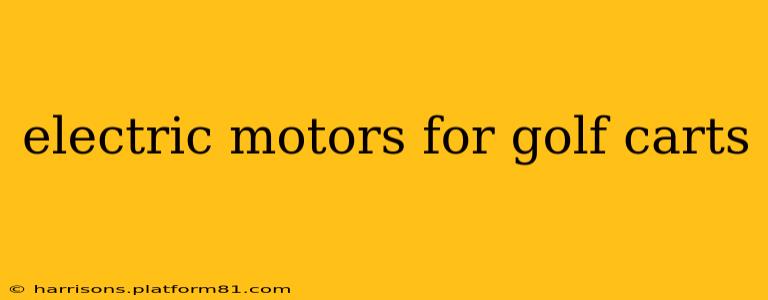Golf carts, once solely powered by gasoline engines, are increasingly embracing electric motors. This shift reflects a growing demand for environmentally friendly, quieter, and often more convenient transportation. But choosing the right electric motor for your golf cart requires careful consideration of several factors. This guide delves into the intricacies of electric golf cart motors, helping you make an informed decision.
What are the different types of electric motors used in golf carts?
Golf carts primarily utilize two types of electric motors: DC (Direct Current) and AC (Alternating Current) motors.
DC Motors: These were the standard for many years. They are relatively simple, inexpensive, and offer good torque at low speeds, ideal for the typical demands of a golf course. However, they are generally less efficient than AC motors and can be less durable over the long term. They also tend to require more maintenance.
AC Motors: AC motors are becoming increasingly prevalent due to their superior efficiency, longer lifespan, and smoother operation. They offer better speed control and are often more powerful, allowing for easier uphill climbs and hauling heavier loads. While initially more expensive, their enhanced performance and longevity often translate to long-term cost savings.
How do I choose the right motor for my golf cart?
Selecting the appropriate motor depends on several crucial factors:
-
Your Budget: AC motors, while offering advantages, generally command a higher upfront cost compared to DC motors.
-
Your Usage: How frequently will you use your golf cart? What terrain will you be traversing? Heavy use or challenging terrain necessitates a more robust motor.
-
Your Golf Cart's Existing System: Switching motor types often necessitates upgrading other components of the golf cart's electrical system, such as the controller and battery pack. This adds complexity and cost to the conversion.
-
Desired Performance: Do you need high torque for steep inclines or high speed for traversing long distances? Different motors excel in different performance areas.
-
Maintenance Considerations: DC motors, while simpler, require more frequent maintenance compared to their AC counterparts.
What are the advantages of using an electric motor in a golf cart?
The benefits of electric golf carts are compelling:
-
Environmental Friendliness: Electric motors produce zero tailpipe emissions, contributing to cleaner air and a reduced carbon footprint.
-
Quieter Operation: Electric motors are significantly quieter than gasoline engines, enhancing the peaceful atmosphere of a golf course.
-
Lower Running Costs: Electricity is generally cheaper than gasoline, leading to lower operational expenses.
-
Reduced Maintenance: While requiring some maintenance, electric motors typically require less upkeep than gasoline engines.
What are the disadvantages of using an electric motor in a golf cart?
While electric motors offer many advantages, there are some potential drawbacks:
-
Higher Initial Cost: The initial investment for an electric golf cart or conversion can be higher than for a gasoline-powered model.
-
Charging Time: Electric golf carts require charging time, which can be inconvenient depending on usage patterns and charging infrastructure.
-
Range Limitations: The distance an electric golf cart can travel on a single charge is limited compared to a gasoline-powered cart, though this is constantly improving with battery technology advancements.
How long do electric golf cart motors last?
The lifespan of an electric golf cart motor depends on several factors, including the type of motor (AC vs. DC), the quality of the motor, usage patterns, and proper maintenance. With proper care, a well-maintained motor can last for many years, often exceeding 10 years.
Can I convert my gasoline golf cart to electric?
Yes, it's possible to convert a gasoline golf cart to electric. However, this is a complex undertaking that often requires specialized knowledge and tools. It typically involves replacing the gasoline engine, fuel system, and transmission with an electric motor, controller, battery pack, and associated wiring and components. This should ideally be undertaken by a qualified professional.
What kind of battery is best for an electric golf cart?
The choice of battery significantly impacts the performance and longevity of your electric golf cart. Common battery types include lead-acid, lithium-ion, and gel-cell batteries. Each type has its pros and cons in terms of cost, lifespan, charging time, and power output. Researching the specifications of different battery types is essential for making an informed decision.
By carefully considering these factors, you can choose the ideal electric motor to power your golf cart, ensuring optimal performance, reliability, and enjoyment for years to come. Remember, consulting with a golf cart specialist can provide invaluable personalized guidance.
